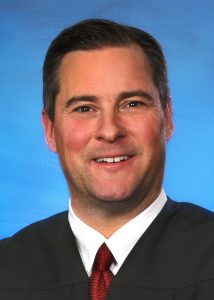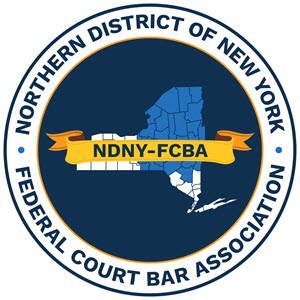 Interviewed by Michael Boyle, President, Capital Region Bankruptcy Bar Association
Interviewed by Michael Boyle, President, Capital Region Bankruptcy Bar Association
Judge Patrick G. Radel took the bench in June 2023. In this interview, he discussed his prior experience as a litigator, his transition to being a judge, practice tips for counsel appearing before him, and the practice area’s trends and needs in the Northern District of New York.
1. What initially drew you to the practice of Bankruptcy Law?
It was a question of timing. I graduated from law school at the University at Buffalo School of Law. I spent my first two years after law school as a law clerk for a Federal District Judge out in Buffalo. I then moved to the Utica area, where my wife is from. I ended up being in private practice for the next 19 years with the same firm, which was a general practice litigation firm. Very shortly after I arrived, Congress enacted BAPCPA [Bankruptcy Abuse Prevention and Consumer Protection Act] and the firm saw an unprecedented explosion in bankruptcy filings. The firm had a creditors’ bankruptcy practice which all the sudden was in desperate need of help handling the influx of cases, the new changes to the Bankruptcy Code under BAPCPA, and how to advise their clients on necessary changes to their internal procedures in dealing with bankruptcy issues. I jumped in with Nick Priore, who was the partner at the firm responsible for their creditors’ bankruptcy practice and I ended up spending a good chunk of my time doing bankruptcy work. Sadly, Nick passed away about three years later and so, three years into practice, I found myself responsible for the largest creditor-side bankruptcy practice in the area.
2. Other than Bankruptcy Law, what else did you focus on in private practice?
My primary area of practice was creditors’ rights. Additionally, I developed a practice representing students with disabilities in special education cases. People would say, “Oh, what kind of law do you practice?” And my answer would be “I’m going to answer that question and you’re going to be surprised because these two things don’t necessarily go together…” I have a son with a disability and became connected in our local disability community and saw that there was a need for advocacy on behalf of students and parents in special education cases, so I made that part of my practice.
3. How has your tenure as a Bankruptcy Judge, if at all, impacted any notions you held about bankruptcy while in private practice?
I used to make the joke as a creditors’ attorney that it was the Federal Rules of Bankruptcy Procedure for creditors and the Federal Recommendations of Bankruptcy Procedure for Debtors. As a judge, I have a better understanding as to why Judges may be reluctant at times to strictly enforce some of the more procedural rules. I don’t mean to be categorical about it. The rules are the rules and they need to be followed and creditors have rights as much as debtors do, but I feel the weight and the responsibility of it now. There can be an understandable reluctance to impose a harsh consequence on an honest, but unfortunate debtor because of procedural irregularities, so there’s a balancing act there.
4. How do you predict Bankruptcy will evolve over your judicial tenure?
When I first started in practice, lots of bankruptcy filings were due to the Debtor having no other way to get a mortgage modification. They couldn’t get someone on the telephone let alone work through the process to see if they qualified for a mortgage modification. Now, between mandatory settlement conferences [in state court foreclosure actions] and most lenders having a pretty robust mortgage modification program, I don’t know if we will see that level of filings again.
I think the sleeping giant may be student loans. Is the guidance set down by the Dept. of Justice sort of a toe in the water for a way for Congress to address the looming, building student loan crisis? Time will tell.
5. What do you consider, from your observations on the bench, as the Bankruptcy world’s biggest need?
Debtor’s Counsel. Particularly in upstate New York, having adequate attorneys available to provide access to justice. The bankruptcy bar, in our area, is an aging bar and, in some cases, there is an absence of attorneys in the community able to meet the needs of Debtors. The system doesn’t run unless Debtors are filing cases and the system doesn’t run efficiently unless the cases are being filed by knowledgeable, committed attorneys. As we see our bar age across the board, having new attorneys ready, willing, and able to represent Debtors will go a long way to seeing what the system looks like.
6. Do you have any tips for how practitioners can get involved in Bankruptcy or where they should start in order to see if it fits their practice interests?
I was never going to be a “hang out my shingle” type of attorney. I am not a risk taker like that. I was fortunate to join a firm that gave me access to a mentor and to be able to develop relationships in the community that gave me a group of people I could call upon. I’ve replicated that here amongst Bankruptcy Judges. Not only is it acceptable, but welcomed, to call up my fellow judges and say “Hey, I’ve got this issue. You ever seen that before? Any suggestions on how I might think about it?” And I’ve found that extremely helpful. If someone can find an attorney to collaborate with, be it formally or informally.
You think, “Oh, well, there’s a book called the Bankruptcy Code” But if you think everything you need to know about Bankruptcy is in the Code, you’re mistaken. There are certain things you can only learn with experience. It’s about finding a tribe of mentors, either formal or informal, and seeking their advice and input.
7. Are there any current trends in Bankruptcy that particularly catch your interest?
We are all on pins and needles for Purdue Pharma. That decision will have long-ranging impacts. There are many cases nationwide depending and counting on the ability for a bankruptcy plan of reorganization to have a channeling injunction and non-consensual third-party releases. We livestreamed the oral arguments here in Chambers. We didn’t have the popcorn, but we might as well have. That’s the bankruptcy issue I’m following closest.
8. Can you discuss your process in how you navigated the transition from legal advocate to legal arbiter, going from private practice to the judiciary?
I don’t know if this would necessarily be true outside of bankruptcy, but I always viewed myself, even as a creditors’ attorney, as a problem solver. My job was to solve a problem and most often, the best way to solve that problem was to collaborate with opposing counsel in trying to figure out a solution that suits everyone’s needs. I find that this job sometimes involves me being a problem solver and sometimes involves me trying to create an environment that is conducive to problem solving by counsel. I will say, most of the time though, if it ends up with me and it’s a group of excellent attorneys, it’s because it’s a difficult problem that’s not easy to solve.
I cared deeply about my cases when I litigated them, but there was a little bit of a remove at the end of well “Ultimately, I can only do what I can do and then it’s up to the judge.” Being on this side of things, I do feel the weight of “It’s my job to get it right” with the knowledge that it has real world consequences.
9. What was your favorite part of private practice? What is your favorite part of your judicial career?
Actual trial work. I did more of it with the special education part of my practice. They have a due process hearing procedure, and I would always tell my clients that it is a trial with all the trappings you would see on TV, but held around a conference table at the school district’s office with an impartial hearing officer, as opposed to a judge in a courtroom. There were objections, evidence submission, oral arguments, cross-examination. I loved that.
As far as being a judge, I’ll give you the very easy, practical answer: much less e-mail. When you think about it, not many people get to e-mail the judge. I went from getting about eighty emails a day to eight. I also went from almost none of my time being my own to almost all of my time being my own. That requires a certain level of discipline and organization, but it also allows for greater freedom and time to think, research, read, consider, and dialogue with my law clerks.
10. How do you find work-life balance in your career?
In private practice or on the bench, it’s always a matter of being mindful for scheduling time for things that are important. Time with your family is rarely urgent, but it’s important. Which means that’s the type of thing that ends up getting put to the wayside unless you’re mindful about it.
I made a decision when I was a young dad, inspired by my father-in-law, to chaperone every field trip for my children. The second day of school, I would be in the teacher’s office or classroom saying “I need the days of the field trips. Now.” I did that so I could get adjournments and keep my calendar clear for those days. It’s about making time to tend to your own self-care and then making things a priority that are important, but rarely urgent.
11. What’s the number one tip you have for attorneys appearing in front of you to be an effective litigant on a case?
You’re safe to assume that I’ve read the papers. It’s the one thing I can control here. I want to be prepared and I want the bar to know that I respect them, that I respect their time, and that I respect the work they do. So they should be prepared for me to be prepared.
On a related note, try to avoid being a last-minute Louie or Louise as the case may be. I understand people are busy and that deadlines drive action, but I want to be prepared and ready to be productive, which means I, you, and opposing counsel need the time to review what you’re submitting, offering, and arguing. Having that happen well before 4 p.m. the day before a hearing is helpful.
I had a formative experience as a young attorney in State Court practice. I went to an oral argument in Delhi, in January. There’s no good way to get from Utica to Delhi in January. So I appear for the argument, I state my appearance, and the judge says, “Opposing counsel called and in light of the weather has decided to rest on his papers. I haven’t read any of the papers, but if you want to make an argument, go ahead.” I remember walking out of there thinking to myself, “I don’t know if I’m ever going to be a judge, but if I’m ever a judge, I’m not going to do that to anybody ever.”
12. Bonus Question: What should the Bills’ number one focus be in the 2024 draft?
Their focus this year and every year until he hangs it up is to get weapons for Josh Allen. Let’s get a speedy wide receiver to catch passes for Josh. Go Bills!

